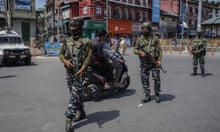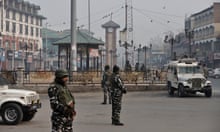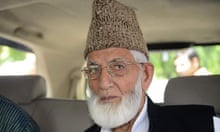Police in Indian-controlled Kashmir have charged family members of the late resistance leader Syed Ali Shah Geelani under an anti-terrorism law for wrapping his body in the Pakistani flag and raising anti-India slogans, officials said on Sunday.
Geelani, who died on Wednesday at the age of 91, was a leading figure in Kashmir’s defiance against New Delhi and had been under house arrest for years.
His son Naseem said Indian authorities buried Geelani in a local cemetery without any family members present after police snatched his body from the home. Police denied that as “baseless rumours” by “some vested interests.”
A video widely shared on social media purportedly showed Geelani’s relatives, mostly women, frantically trying to prevent armed police from forcing their way into the room where his body, wrapped in a Pakistani flag, was being kept. It showed women wailing and screaming as police took the body and locked his family and relatives inside the room.
Police said unspecified family members and some others were charged on Saturday under the Unlawful Activities (Prevention) Act. They have not yet been taken into custody.
The anti-terrorism law was amended in 2019 to allow the government to designate an individual as a terrorist. Police can detain a person for six months without producing any evidence, and the accused can subsequently be imprisoned for up to seven years. Rights activists have said the law is draconian.
Naseem said on Sunday that a police officer visited the family on Saturday and informed them a case had been registered. Naseem did not provide further details about the meeting, but said there were scuffles as the police removed his father’s body.
“Amid the chaos, we didn’t really know what was happening. We were mourning,” he said.
Kashmir has long been a flashpoint between India and Pakistan, which administer parts of the Himalayan region while claiming it entirely.
Geelani spearheaded Kashmir’s movement for the right to self-determination and was a staunch proponent of merging Kashmir with Pakistan. For many in Kashmir and beyond, he was an enduring emblem of defiance against India.
India describes the armed rebellion as Islamabad’s proxy war and state-sponsored terrorism. Most Muslim Kashmiris consider it a legitimate freedom struggle and support the territory’s unification, either under Pakistani rule or as an independent country.
The region is one of the most heavily militarised in the world. Tens of thousands of civilians, rebels and government forces have been killed in the conflict.
Tensions flared in the region in 2019 after New Delhi stripped Kashmir’s semi-autonomy, scrapped its statehood and removed inherited protections on land and jobs.








